- Clone
- C15.6 (See other available formats)
- Regulatory Status
- RUO
- Other Names
- Interleukin-12 p40, Interleukin-23 p40, Cytotoxic lymphocyte maturation factor (CLMF), Natural killer cell stimulatory factor (NKSF), CTL maturation factor (TcMF), T-cell stimulating factor (TSF)
- Isotype
- Rat IgG1, κ
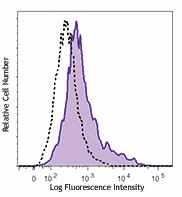
-

IFNγ-stimulated (2 hours) Balb/c macrophages in the presence of LPS and monensin (24 hours) were fixed, permeabilized, and intracellularly stained with IL-12/IL-23 p40 (clone C15.6) PE/Cyanine7 (filled histogram) or rat IgG1, κ PE/Cyanine7 (open histogram).
| Cat # | Size | Price | Quantity Check Availability | ||
|---|---|---|---|---|---|
| 505209 | 25 µg | $136.00 | |||
| 505210 | 100 µg | $358.00 | |||
The C15.6 antibody reacts with mouse IL-12 p40 subunit of the IL-12 p70 and IL-23 p40 subunit of the IL-23 p19/p40, as well as p40 monomer and homodimer, or heterodimer. The C15.6 antibody can not neutralize the bioactivity of natural or recombinant IL-12.
Product Details
- Verified Reactivity
- Mouse
- Antibody Type
- Monoclonal
- Host Species
- Rat
- Immunogen
- CHO-expressed, recombinant mouse IL-12 p70
- Formulation
- Phosphate-buffered solution, pH 7.2, containing 0.09% sodium azide.
- Preparation
- The antibody was purified by affinity chromatography and conjugated with PE/Cyanine7 under optimal conditions.
- Concentration
- 0.2 mg/ml
- Storage & Handling
- The antibody solution should be stored undiluted between 2°C and 8°C, and protected from prolonged exposure to light. Do not freeze.
- Application
-
ICFC - Quality tested
- Recommended Usage
-
Each lot of this antibody is quality control tested by intracellular immunofluorescent staining with flow cytometric analysis. For flow cytometric staining, the suggested use of this reagent is ≤0.5 µg per million cells in 100 µl volume. It is recommended that the reagent be titrated for optimal performance for each application.
- Excitation Laser
-
Blue Laser (488 nm)
Green Laser (532 nm)/Yellow-Green Laser (561 nm)
- Application Notes
-
ELISA or ELISPOT Capture1,2,4,6,8,10: The purified C15.6 antibody is useful as the capture antibody in a sandwich ELISA or ELISPOT assay, when used in conjunction with the biotinylated C17.8 (Cat. No. 505302) antibody as the detecting antibody. This assay detects p40 as monomer, homodimer, or heterodimer complexed with p35. The LEAF™ purified antibody is suggested for ELISPOT capture.
Additional reported applications (for the relevant formats) include: immunohistochemical staining9 of paraformaldehyde-fixed saponin-treated frozen tissue sections, immunoprecipitation3, and Western blotting3.
Note: For testing mouse IL-12 p40 (monomer, dimer, heteromer) in serum or plasma, BioLegend's ELISA Max™ Sets (Cat. No. 431601 to 431606) are specially developed and recommended. -
Application References
(PubMed link indicates BioLegend citation) -
- Kitagaki K, et al. 2002. Clin. Diagn. Lab Immunol. 9:1260.
- Reichmann G, et al. 1999. J. Immunol. 163:3354.
- Wysocka M, et al. 1995. Eur. J. Immunol. 25:672.
- Gately M. 1995. Curr. Prot. Immunol. John Wiley and Sons, New York. Unit 6.16.
- Macatonia S, et al. 1995. J. Immunol. 154:5071.
- O'Connell PJ, et al. 2006. Blood 107:1010.
- Akilov OE, et al. 2007. J. Leukocyte Biol. 2007;10.1189/jlb.0706439.
- Dzhagalov I, et al. 2007. J. Immunol. 178:2113.
- Huang LY, et al. 2001. J. Immunol. 167:1423.
- Xu G, et al. 2007. J. Immunol. 179:5358. PubMed
- Charles N, et al. 2010. Nat. Med. 16:701. (FC) PubMed
- Malu DT, et al. 2011. J. Immunol. 186:6271. PubMed
- Product Citations
-
- RRID
-
AB_2565645 (BioLegend Cat. No. 505209)
AB_2565645 (BioLegend Cat. No. 505210)
Antigen Details
- Structure
- Cytokine; monomer, heterodimer (p40:p35 or p40:p19) or homodimer (p40:p40)
- Bioactivity
- IL-12 p70 (p40:p35) induces IFN-γ, TNF-a production in T and NK cells; costimulation of PBL proliferation; proliferation/differentiation of TH1 T lymphocytes. IL-23 (p40:p19) induces proliferation and production of IFN-γ by human me
- Cell Sources
- Dendritic cells, monocytes/macrophages, B cells, T cells
- Cell Targets
- T cells, NK cells
- Receptors
- IL-12Rβ1 binds p40; dimeric with IL-12Rβ2 binds p35
- Biology Area
- Immunology, Innate Immunity
- Molecular Family
- Cytokines/Chemokines
- Antigen References
-
1. Fitzgerald K, et al. Eds. 2001. The Cytokine FactsBook. Academic Press, San Diego.
2. Quesniaux V. 1992. Research Immunol. 143:385.
3. Trinchieri G, et al. 1992 Prog. Growth Factor Res. 4:355.
4. Trinchieri G, et al. 1993 Immunol. Today. 14:335.
5. Oppmann B, et al. 2000 Immunity. 13:715.
6. Aggarwal S, et al. 2003 J. Biol. Chem. 278:1910.
7. Parham C, et al. 2002 J. Immunol. 168:5699.
8. Belladonna ML, et al. 2002 J. Immunol. 168:5448.
9. Lankford, CS, et al. 2003 J. Leukocyte Biol. 73:49. - Regulation
- Downregulated by IL-10; homodimeric p40 antagonistic to functional p70 heterodimer; p40 monomer has no function; p40 subunit in common with IL-23
- Gene ID
- 16160 View all products for this Gene ID
- UniProt
- View information about IL-12/IL-23 p40 on UniProt.org
Other Formats
View All IL-12/IL-23 p40 Reagents Request Custom Conjugation| Description | Clone | Applications |
|---|---|---|
| APC anti-mouse IL-12/IL-23 p40 (monomer, dimer, heterodimer) | C15.6 | ICFC |
| PE anti-mouse IL-12/IL-23 p40 (monomer, dimer, heterodimer) | C15.6 | ICFC |
| Purified anti-mouse IL-12/IL-23 p40 (monomer, dimer, heterodimer) | C15.6 | ELISA Capture,IHC-F,IP,WB |
| PE/Cyanine7 anti-mouse IL-12/IL-23 p40 (monomer, dimer, heterodimer) | C15.6 | ICFC |
| PerCP/Cyanine5.5 anti-mouse IL-12/IL-23 p40 (monomer, dimer, heterodimer) | C15.6 | ICFC |
| Alexa Fluor® 700 anti-mouse IL-12/IL-23 p40 | C15.6 | ICFC |
| APC/Fire™ 750 anti-mouse IL-12/IL-23 p40 | C15.6 | ICFC |
| PE/Dazzle™ 594 anti-mouse IL-12/IL-23 p40 | C15.6 | ICFC |
| Brilliant Violet 750™ anti-mouse IL-12/IL-23 p40 | C15.6 | ICFC |
Compare Data Across All Formats
This data display is provided for general comparisons between formats.
Your actual data may vary due to variations in samples, target cells, instruments and their settings, staining conditions, and other factors.
If you need assistance with selecting the best format contact our expert technical support team.
-
APC anti-mouse IL-12/IL-23 p40 (monomer, dimer, heterodimer)
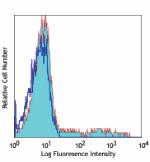
IFN-γ primed murine peritoneal macrophages stimulated with L... -
PE anti-mouse IL-12/IL-23 p40 (monomer, dimer, heterodimer)
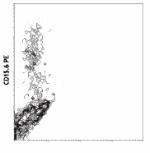
rmIFN-γ/LPS stimulated BALB/c peritoneal macrophages were st... -
Purified anti-mouse IL-12/IL-23 p40 (monomer, dimer, heterodimer)
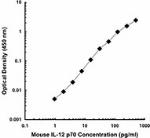
-
PE/Cyanine7 anti-mouse IL-12/IL-23 p40 (monomer, dimer, heterodimer)
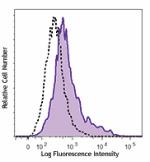
IFNγ-stimulated (2 hours) Balb/c macrophages in the presence... -
PerCP/Cyanine5.5 anti-mouse IL-12/IL-23 p40 (monomer, dimer, heterodimer)
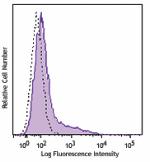
IFNκ-stimulated (two hours) Balb/c macrophages in the ... -
Alexa Fluor® 700 anti-mouse IL-12/IL-23 p40

IFNγ-stimulated (2 hours) Balb/c macrophages in the presence... -
APC/Fire™ 750 anti-mouse IL-12/IL-23 p40
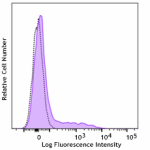
IFNγ-stimulated (two hours) Balb/c macrophages in the presen... -
PE/Dazzle™ 594 anti-mouse IL-12/IL-23 p40
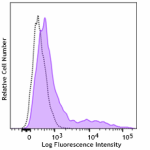
IFNγ-stimulated (two hours) Balb/c macrophages in the presen... -
Brilliant Violet 750™ anti-mouse IL-12/IL-23 p40

IFN-γ stimulated (2 hours) BALB/c macrophages in the presenc...
